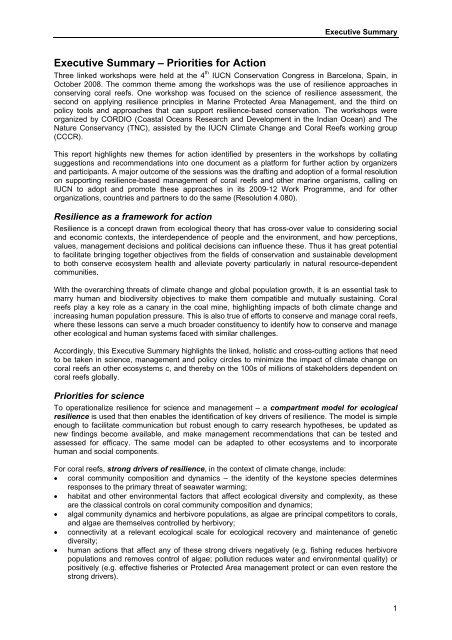Obura2009-IUCN Congress report - Resilience sessions
Obura2009-IUCN Congress report - Resilience sessions.pdf
Obura2009-IUCN Congress report - Resilience sessions.pdf
You also want an ePaper? Increase the reach of your titles
YUMPU automatically turns print PDFs into web optimized ePapers that Google loves.
Executive Summary<br />
Executive Summary – Priorities for Action<br />
Three linked workshops were held at the 4 th <strong>IUCN</strong> Conservation <strong>Congress</strong> in Barcelona, Spain, in<br />
October 2008. The common theme among the workshops was the use of resilience approaches in<br />
conserving coral reefs. One workshop was focused on the science of resilience assessment, the<br />
second on applying resilience principles in Marine Protected Area Management, and the third on<br />
policy tools and approaches that can support resilience-based conservation. The workshops were<br />
organized by CORDIO (Coastal Oceans Research and Development in the Indian Ocean) and The<br />
Nature Conservancy (TNC), assisted by the <strong>IUCN</strong> Climate Change and Coral Reefs working group<br />
(CCCR).<br />
This <strong>report</strong> highlights new themes for action identified by presenters in the workshops by collating<br />
suggestions and recommendations into one document as a platform for further action by organizers<br />
and participants. A major outcome of the <strong>sessions</strong> was the drafting and adoption of a formal resolution<br />
on supporting resilience-based management of coral reefs and other marine organisms, calling on<br />
<strong>IUCN</strong> to adopt and promote these approaches in its 2009-12 Work Programme, and for other<br />
organizations, countries and partners to do the same (Resolution 4.080).<br />
<strong>Resilience</strong> as a framework for action<br />
<strong>Resilience</strong> is a concept drawn from ecological theory that has cross-over value to considering social<br />
and economic contexts, the interdependence of people and the environment, and how perceptions,<br />
values, management decisions and political decisions can influence these. Thus it has great potential<br />
to facilitate bringing together objectives from the fields of conservation and sustainable development<br />
to both conserve ecosystem health and alleviate poverty particularly in natural resource-dependent<br />
communities.<br />
With the overarching threats of climate change and global population growth, it is an essential task to<br />
marry human and biodiversity objectives to make them compatible and mutually sustaining. Coral<br />
reefs play a key role as a canary in the coal mine, highlighting impacts of both climate change and<br />
increasing human population pressure. This is also true of efforts to conserve and manage coral reefs,<br />
where these lessons can serve a much broader constituency to identify how to conserve and manage<br />
other ecological and human systems faced with similar challenges.<br />
Accordingly, this Executive Summary highlights the linked, holistic and cross-cutting actions that need<br />
to be taken in science, management and policy circles to minimize the impact of climate change on<br />
coral reefs an other ecosystems c, and thereby on the 100s of millions of stakeholders dependent on<br />
coral reefs globally.<br />
Priorities for science<br />
To operationalize resilience for science and management – a compartment model for ecological<br />
resilience is used that then enables the identification of key drivers of resilience. The model is simple<br />
enough to facilitate communication but robust enough to carry research hypotheses, be updated as<br />
new findings become available, and make management recommendations that can be tested and<br />
assessed for efficacy. The same model can be adapted to other ecosystems and to incorporate<br />
human and social components.<br />
For coral reefs, strong drivers of resilience, in the context of climate change, include:<br />
• coral community composition and dynamics – the identity of the keystone species determines<br />
responses to the primary threat of seawater warming;<br />
• habitat and other environmental factors that affect ecological diversity and complexity, as these<br />
are the classical controls on coral community composition and dynamics;<br />
• algal community dynamics and herbivore populations, as algae are principal competitors to corals,<br />
and algae are themselves controlled by herbivory;<br />
• connectivity at a relevant ecological scale for ecological recovery and maintenance of genetic<br />
diversity;<br />
• human actions that affect any of these strong drivers negatively (e.g. fishing reduces herbivore<br />
populations and removes control of algae; pollution reduces water and environmental quality) or<br />
positively (e.g. effective fisheries or Protected Area management protect or can even restore the<br />
strong drivers).<br />
1


















